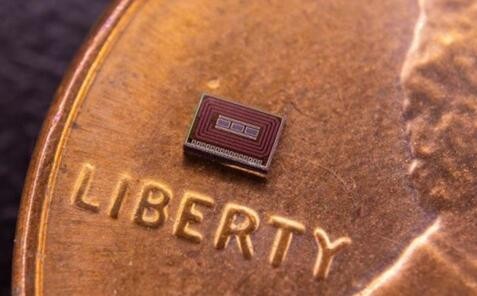
Mini-alcohol monitoring core that can be implanted on the skin surface (compared to the size of a 25-cent coin)
According to James Consulting, engineers at the University of California, San Diego have developed a miniature, ultra-low-power, biosensor that can be implanted into the skin to monitor the body's alcohol content over a long period of time. The chip is very small in size and can therefore be implanted under the skin of human skin and powered by wireless wearable devices such as smart watches or smart patches.
"The ultimate goal of this work is to develop a routine and easily accepted alcohol and drug monitoring device for patients who abuse drug treatment programs," said Drew Hall, professor of electrical engineering at the Jacobs School of Engineering at the University of California, San Diego. Hall also works at the Wireless Communication Center and Wearable Sensor Center at the University of California, San Diego. His team presented this work at the 2018 IEEE Customized Integrated Circuits Conference (CICC) in San Diego on April 10.
One of the challenges faced by patients' treatment options is the lack of convenient routine monitoring tools. Hall believes that the Respiratory Analyzer is currently the most common way to estimate the concentration of alcohol in the blood. The disadvantages are clumsiness, long initialization time and inaccuracy. Blood tests are the most accurate method, but they require a trained technician to complete. The alcohol-sensing sensor, which looks like a “tattooâ€, is a new choice for “wearing†on the skin, and it is also convenient to “take off†after a single use. It is a promising sensor.
Hall said: "Small implantable sensors can be used in clinics without operating rooms, making it easier for patients to monitor for long periods of time according to prescribed procedures."
The biosensor chip is about one cubic millimeter in size and can be implanted in the interstitial fluid under the skin (intercellular fluid is a tissue fluid present in the interstitial cells of the body). The biosensor has a sensor covered by alcohol oxidase, which can selectively interact with alcohol to produce by-products that are detected electrochemically. The electrical signal is wirelessly transmitted to a nearby wearable device (such as a smart watch), which is also a device that wirelessly charges the sensor. The other two sensors on the chip are responsible for measuring the background signal and pH. In order to ensure a more accurate alcohol reading, these two sensors have been cancelled.
Researchers try to minimize power consumption by a total of 970 nanowatts, which is about a millionth of the power consumption of a smartphone. "We don't want to see chips have a significant impact on the battery life of wearable devices," Hall said. "We don't want a lot of heat on the skin where the sensor is implanted, and we don't want potentially toxic batteries."
One way this ultra-low-power chip works is to transfer data through a technique called backscatter. When a device such as a smart watch nearby sends a radio frequency signal to the chip, the chip modifies the data and returns a reflected signal to the smart watch. The researchers also designed ultra-low-power sensor readout circuitry for the chip, reducing measurement time to three seconds, reducing power consumption.
Researchers have completed a simulated test of implanted human body in an in vitro environment, primarily by mixing ethanol in diluted human serum and implanting it under the skin of the pig.
For future research, the researchers plan to test the chips on the animal's living body. Hall's team worked with CARI Therapeutics, a startup founded in Qualcomm Institute Innovation Space, San Diego, Calif., and Dr. Carla Marienfeld, an addictive psychiatrist specializing in the treatment of substance abuse disorders in San Diego, Calif., to optimize next-generation rehabilitation monitoring chips. Hall's team is developing a biochip that monitors other molecules and drugs in the body.
“This is a proven technology for a conceptual platform. We have proven that this chip can be used for alcohol monitoring, but we will develop a chip that can monitor different substances of abuse. And we can tailor the required substances according to the needs of patients. Chips to provide long-term personalized medical monitoring," Hall said.
We are manufacturer of Medical Detection Products in China, if you want to buy Detection Products,Disposable Detection Products,Safety Detection Products please contact us.
Medical Detection Products,Detection Products,Disposable Detection Products,Safety Detection Products
Luck Medical Consumables Co.,LIMITED , https://www.luckmedical.com